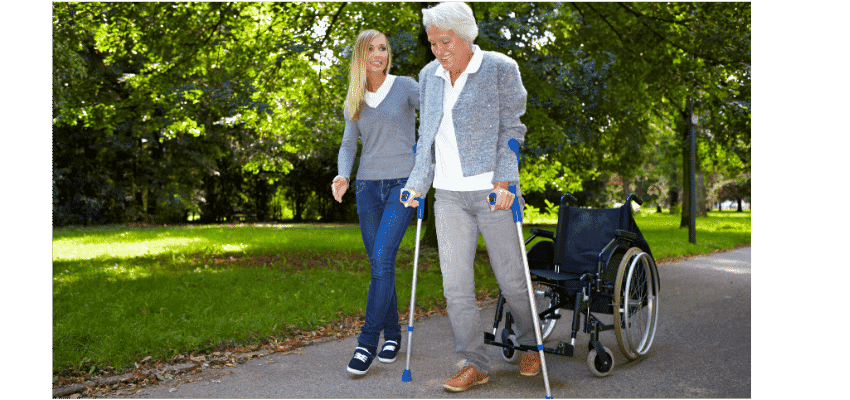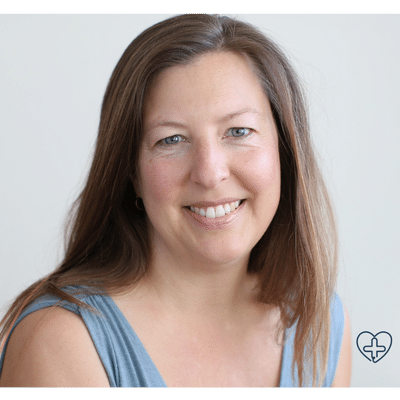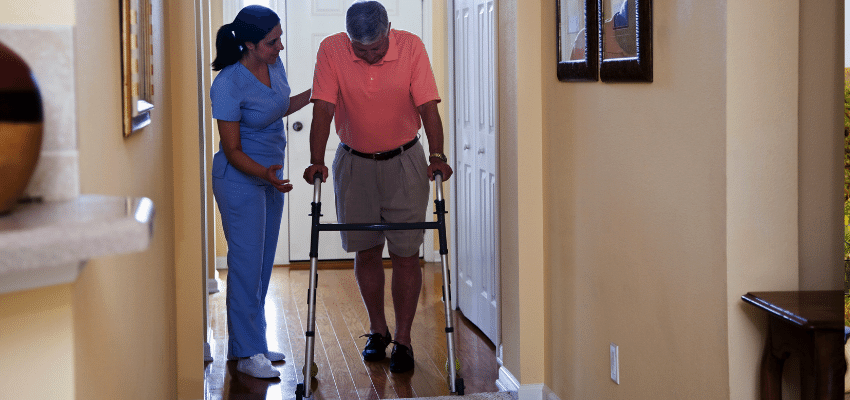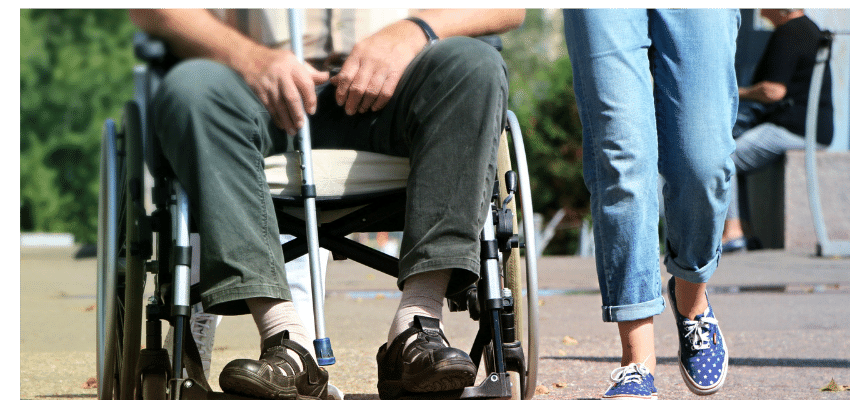Professional Caregivers Care for Patients and Family

Table of Contents
Missy’s Capacity for Caregiving
What should a caregiver know when preparing to care for someone sent home to recover?
Being a caregiver doesn’t come naturally to everyone, yet many of us are called on to provide care for a friend or family member at some point in time. But for some people, like Missy Migdal, caregiving is practically their superpower.
Professionally, Missy is an in-home healthcare nurse. When a doctor orders in-home care for a patient, she’s the person who goes to a patient’s residence to make sure their current setup meets their needs for a safe and healthy recovery.
Personally, Missy helps her close family members manage their health needs and has helped friends in caregiving situations as well. Though caregiving can overwhelm some people, Missy realized, “I’m just good at it… So I can see where I can fit into this situation and make it easier for my friend.”

There is a lot that we family caregivers can learn from an empathetic and capable pro like Missy, who has both personal and professional in-home caregiving experiences.
You can read on to learn what she wishes new family caregivers knew right away and her recommendations for caregiver support.
In-home healthcare nurse POV
Missy works with patients whose health conditions range from diabetes to wound care, heart conditions, or fractures, and their needs vary.
For example, elderly patients are more prone to falling, which she considers when visiting a new home. “I ask them if they’ve fallen or had any recent accidents, and I have them describe them to me,” she explains.
“Did they hit their head? Where did they fall? We go through it step-by-step. If I think they have a fracture, I’d have them get a CT scan or an X-ray to rule that out.”
She goes through each room of the home looking for potential trip hazards and notes where safety modifications like grab bars, mobility aids, and fire extinguishers are needed.

What caregivers need to know
A family member new at providing care for an elderly or injured relative might not know to ask about these things, but access to the correct information is a healing game changer.
Get patient discharge paperwork.
According to Missy, one of the essential resources for new and seasoned caregivers is the patient’s discharge paperwork — but not everyone receives this after being discharged from a healthcare facility. Why not?
“Caregivers need to ask for that. It is a stack of papers with all the medications, how to use them, what the procedure was, what the patient should do or shouldn’t do, etc.,” Missy said.
“Often caregivers don’t get this or may throw it away accidentally. However, they should always get the packet, read it, and ensure they know the signs and symptoms of the patient's situation worsening or changing.”
Empowering caregivers with information helps them determine what’s part of the typical healing trajectory and what warrants a call to the doctor.

Caregivers need to manage a prescribed care plan.
Regardless of whether someone is a professional or family caregiver, they must be prepared to ask questions and gather as much information as possible when beginning to provide care.
“[The caregiver] should know the care plan,” she said. A follow-on schedule must be set up and managed for the best results. Missy says this is especially true when caring for anyone recently discharged.
“Patients need a follow-up appointment within one week of a procedure, but not every doctor or clinic will schedule a follow-up appointment with the surgeon. So sometimes the caregiver has to work and pursue that."
The clinic would call and proactively make that appointment in a perfect world, but that doesn’t always happen. So the family caregiver must know in advance that this is a crucial step to ensure everything goes smoothly.
When do family caregivers need professional help?
When people are healing or recovering at home, managing a doctor-prescribed care schedule is vital to healing. This requires regular monitoring from the primary doctor or other at-home visiting nurses as part of the schedule.
According to Missy, a typical situation is when a doctor tracks the patient to make sure they progress on schedule during office appointments. These regular check-ins help the doctor determine if the patient needs extra support.
You can also get paid care assistance to help out from the professionals at Care.com. They have skilled nursing and extra hands ready in your area to keep everyone healing and cared for.
Extra support can also come to you with scheduled visits from an in-home care specialist. Depending on the patient’s needs, this cadre of specialists may include physical therapy, occupational therapy, or a nurse aide.

Where family caregivers get support
Though a caregiver focuses on advocating for the person they care for, it’s just as important to take care of themselves along the way. The key is to ask for help as soon as possible — not when you’re already feeling burned out.
Once a family caregiver is in the depths of caring for another person, they don’t necessarily have time to search for answers or assistance. Many family caregivers, they don’t even know where to begin looking.
“Before the patient leaves the hospital, the caregiver should talk to a medical social worker to get information about support groups that might be out there or information on their specific disease,” Missy said.
Caregiver resources to avoid burnout
Caregiver fatigue is real and can affect the healing of the patient. Missy believes the sooner a caregiver knows where to go for help, the better off the caregiver and their loved ones will be in the long run.
Caregivers need to manage their stress levels and anxiety when caring for someone else. The Headspace app is an exciting support tool that can help both the caregiver and the person recovering with guided meditations. When someone has been hurt and is trying to get better, stress affects both parties.
Missy recommends checking out AARP and the National Alliance for Caregiving for general information and resources on specific conditions and support groups.
She turns to the Mayo Clinic and PubMed from the National Institutes of Health for medical articles and answers.
And because caregiving can take a financial toll, she often tells family caregivers there are ways to get paid for their work, even if they’re not professional in-home healthcare providers.
Take a break
But even with the scheduled help, information, tools, and solutions, caregivers need to pay attention to their health.
Missy stresses that taking breaks and asking for help is central to being a practical and empathetic caregiver “Because they can provide better care for their loved one. Otherwise, you’ll burn out.”
Thanks, Missy; this is some constructive caregiving advice!

Partners in this Article
Care.com
Care.com connects you to vetted professionals to help you manage the daily demands of child care, senior care, pet care, and housekeeping.
Headspace
Headspace's app offers different strategies such as meditation and mindfulness to improve your happiness and well-being.
Carex
Carex Compass Brands is a leader for smart in-home, self-care medical products. They sell quality products that bring dignity, ease of use and promote independence for use in the comfort of your home.



